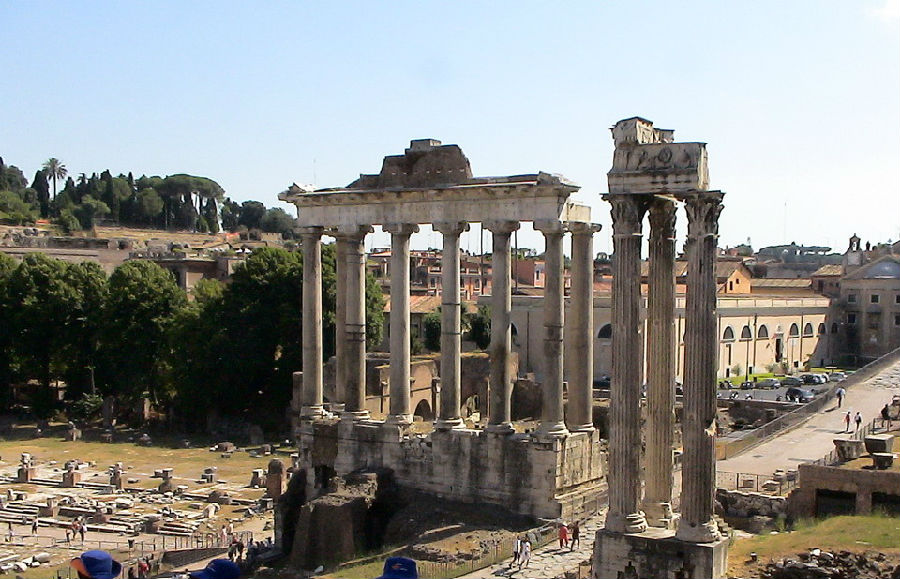Segment nine A: Introduction. Everything changes,
第九節 A 簡介,所有事都在變化
and we change right along with everything.
我們也隨著一起改變
In this exciting lecture, Rome will continue trying to
本課很精彩,羅馬將會繼續努力
deal with both the positive and negative consequences
解決作為地中海超級大國
of being the superpower of the Mediterranean world.
所帶來的積極和消極的影響
The Romans had been reasonably familiar with the
羅馬人一直都合情合理地對他們在
ancient Greeks they encountered in Italy. But when they
意大利遇到的古希臘人很熟悉
conquered Greece, it turns out, the Greeks in turn
但是當他們征服了希臘,結果卻是
conquered the Romans, to use Horace's phrase.
希臘人反過來征服了羅馬人,賀拉斯這樣說

Like the Roman empire, the Roman government was a work
就像羅馬帝國,羅馬政府是一個
in progress,and not all of the progress was positive.As
還在進行中的工作,不是所有成果都是正面的
the Roman nation became more wealthy and more powerful,
隨著羅馬變得越來越富有和強大
so did individual Romans.The tension between the wealth
羅馬人也是
and power of individual Romans and the practice of
富有強大的羅馬人與民主實施之間的緊張關系
democracy would cause great problems down the line.
將在各個階段引發很多的問題
In segment nine B: Romans and Hellenism, we take up the
第九節 B 羅馬人與古希臘文化
Romans' love-hate relationship with the ancient Greeks.
我們繼續講羅馬人對古希臘人又愛又恨的關系
After the conquest of Greece, Romans re-discovered
占領希臘以后,羅馬人重新探索
Hellenism,the cosmopolitan Greek lifestyle developed in
古希臘文化這種世界性的希臘生活方式
classical mainland Greece and spread throughout the
它成形于古典希臘大陸,亞歷山大大帝將其
Eastern Mediterranean by Alexander the Great.
傳播到了東地中海
Hellenism opened up a new world of art, literature and
古希臘文化打開了藝術,文學的新大門
creature comforts far beyond what the mos maiorum
創造了遠遠超過祖制所規定的舒適
prescribed. The Romans would tend to look down their
羅馬人傾向于看不起希臘人
nose at the Greeks for being soft and frivolous, and
認為他們軟弱,毫無價值
unable to rule themselves effectively. Yet the Romans
無法有效地管理國家
wholeheartedly admired the Greeks'cultural achievements
但是羅馬人真心地羨慕希臘人的文化成就
and adapted many Greek customs and Greek technologies
并接納吸收了很多希臘習俗和希臘科技
for their own use and some they just took over outright
有一些他們還直接拿來用
The result was a truly Greco-Roman civilization which
結果是出現了真正地古希臘羅馬文明
served as the foundation for, what we'll call, the Roman Empire.
它是羅馬帝國的基礎
In segment nine C: The Costs of Success,
第九節 C 成功的代價
Rome wrestles with the social costs of her success,
羅馬與她成功的社會代價博弈著
most notably, the decline of Rome's former backbone,
主要指羅馬以前中堅分子
the small farmer class. Killed off in Rome's wars or
小農階級的衰落,死于羅馬的戰爭
run off of their farms by agribusiness concerns
或者因為大莊園制的原因逃離農場
called latifundia, the former small farmers had nowhere
以前的小農無處可去
to run but the cities. This usually meant Rome.
只能逃往城市,一般都逃往羅馬
Rome evolved politically during this time,
在這段時間羅馬在政治上得到發展
but only in certain ways.
但只限于某些方面
Allowing the plebeians, wealthy plebeians, that is,
準許貧民,富有的平民
to hold political office and to marry patricians
獲得一官半職并且準許他們與貴族通婚
was a positive change. The so-called noble class or
是積極的改變
nobilitas ,which sprang up from the mixture of classes
這些所謂的貴族階級或者貴族來自混合階級
brought needed fresh blood into Roman leadership.
為羅馬的領導帶來了所需的新鮮血液
But on the other hand, little, if anything,was done for
但是另一方面,他們并沒有為城市中的窮人
the urban poor, even by those politicians who pretended
做些什么,甚至那些假裝關心窮人
to care for their interests.The urban poor had little
利益的政治家也沒有做什么
to look forward to and little hope of bettering their
城市中的窮人沒有什么可期待的,生活能變得
lot in life.The same was true of Rome's Italian allies.
更好也沒望,這對于羅馬的意大利同盟也一樣
The Italian allies were expected to contribute men and
羅馬希望意大利同盟們為羅馬的戰爭
money to Rome's war efforts, but because they were not
貢獻男人與金錢,但是因為他們不是
citizens they got nothing in return.
公民所以他們什么回報都得不到
Segment nine D: Rise of Militarism explains what
第九節 D 軍國主義抬頭解釋了
happened when Rome's growing empire required more
當羅馬逐漸變為帝國,她需要越來越多的
and more soldiers, only to find the small farmer class was gone. For decades, the neglected small farmer class
戰士,但她只發現小農階級逃跑了的事實幾十年來,被忽略的小農階級
had been moving into the city, becoming poor and
不斷涌向城市,變得貧窮
therefore becoming ineligible for military service.
所以不夠資格參軍











